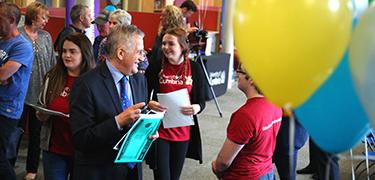1) Qualifications Check ☑
If your Applicant Portal still shows you need to provide evidence of qualifications, please upload these to your portal. If you are a PGCE student, we must see the original of your Degree Certificate so either post these, bring it with you to Registration, or a drop-in session.
2) Check your Student Finance ☑
Depending on your course, you may be entitled to a student loan or bursary. For more information, see the Money Advice pages and the Student Finance FAQs.
The Student Loans Company guidance provides support and an application tracker.
Create a student budget, using an online budgeting tool or app. This will help you to keep track of your income and outgoings and avoid overspending in the first few weeks.
3) Right to Study Check (On campus, non-DBS courses) ☑
If you have been asked to provide your Right to Study evidence, please upload to your Applicant Portal a copy of your photo ID preferably your passport, if do you do not have a passport you will need to provide an alternative form of photo ID such as your driving licence along with your birth certificate. If you are not British/Irish you will need to provide your Share Code or Biometric Residence Permit (BRP).
4) Complete Disclosure & Barring Service (DBS) clearance and Right to Work Checks ☑
If your programme requires you to complete a DBS check, this will need to be completed and passed before you are confirmed as a fully registered student.
Our DBS webpage confirms which courses require a DBS and gives guidance on the process including the application process, ID documents required and FAQs
If you have any queries or have not received information about how to apply for DBS, please contact the DBS team: dbsapply@cumbria.ac.uk
If the Applicant Portal still shows you need to provide evidence of the Right to Work, please upload one of the following to the portal. We cannot begin your DBS application without confirming your Right to Work in the UK.
- A current or expired Passport showing you are a British or Irish citizen
- A Birth or Adoption certificate from the UK/Ireland
- A Right to Work share code as part of the EU Settlement scheme
- A Right to Work share code which you have registered your Biometric Residence Permit or Card
- A current Passport (any nationality) endorsed to show you are allowed to stay indefinitely in the UK
- A current Passport (any nationality) endorsed to show you are allowed to stay indefinitely in the UK and are currently allowed to work/study
For further information please see our guidance on the DBS webpage
5) Make sure your vaccinations are up to date ☑
Meningitis is a life-threatening infectious disease and the student population is the second most at risk group. Find out more at the Meningitis Trust.
Measles, Mumps and Rubella (MMR) are three common childhood illness which can have serious complications. Find out more at NHS Online.
If you suffer from a chronic condition, check with your GP about the need for a 'Flu or Pneumonia vaccination. Influenza or 'Flu and Pneumonia are illnesses which can have serious consequences for those with existing healthcare conditions.
Information about Coronavirus (COVID-19) vaccines
6). Healthy Relationships Training - Blackboard
All new students are required to complete the healthy relationships training at the start of their course. To complete the training you must undertake 3 short courses, (approximately 30 - 40 minutes) reviewing all slides and completing all questions. Shortly before starting your course, we will email you with a link to the training. Apprenticeship students must complete the training as part of their mandatory e-learning in their Learning Plan.
7) Receive your MyCumbria Card ☑
You will be asked to upload a photo during online registration enabling us to create and activate your Cumbria Card before you arrive. See photo upload guide. You can collect your card from the library at your base campus. For distance learners, the card will be posted to you. If you have not received your card within a few days of starting lectures then please contact the library at your site.
8) Do you wish to disclose a disability or learning difference? ☑
Letting our disability team know in advance will help us to make any accommodations you may need to support your learning. Please complete our Support Request Form to let us know about the impact of your disability or learning difference.
9) Transport and Travel ☑
Buses: University of Cumbria students can get discounted season tickets for bus travel in Carlisle and Lancaster. For more details of the offer for each city, see the Unirider section of the Stagecoach website. Scroll down to see details for Carlisle and Lancaster.
Trains: Get a third off travel with a 16-25 railcard.
Cycling: All university sites have cycle parking facilities. Check the Campus Maps, or ask at the site reception.
Car parking: If you are driving to campus, please familiarise yourself with the University Car Parking Policy 2025 - 2026. Applications for parking permits for University of Cumbria sites must now be made online. Get a parking permit.
10) Consider an insurance policy ☑
You are responsible for arranging insurance for your own personal possessions. The university does not accept responsibility for loss of, or damage to property brought on to university premises.
Students staying in halls will have content insurance provided as a part of their contract.
For other students, there are lots of insurers and insurance policies available and some specifically designed for students. Do check your current insurance status, you may be able to extend any home insurance policies you already have. Also see NUS Online.
11) Add the Student Hub to your mobile ☑
The Student Hub allows you to easily and simply access all the systems and information you will need whilst at university. You can use the web version hub.cumbria.ac.uk or download the 'Cumbria App' from the following providers:
12) Download Walk-Safe (Cumbria Based Students)
WalkSafe+ is the UK’s leading personal safety app which combines journey-sharing features and a national Safe Space map. The map plots safety-trained venues across the UK in partnership with Local Authorities and Businesses that offer safety facilities such as phone charging stations and free period products, enabling our users to find help in real-time while on their commute home. WalkSafe+ has a suite of tracking and non-tracking features available, which enables trusted friends to follow your live journey should you need it.
The free app has received the backing of organisations and agencies including Cumbria Police, Cumberland Council, Armstrong Watson and the University of Cumbria.
The app features a map of the city that pinpoints local venues that have received accreditation in certain safety standards that may make people feel safer on a night out.
The app also can help people plot a safer route home.
Users can share their live location with trusted contacts and the app will notify friends and family when they get home safely.
It features an SOS button to alert trusted friends immediately that you feel in danger. The app also highlights features such as:
- Venues that operate the Ask for Angela scheme, where people can ask a member of staff for support by “asking for Angela”.
- On-street support, such as the Safer Streets Welfare Hub in Carlisle City Centre.
13) Make childcare arrangements ☑
If you are a parent or carer, there is information and support available.
Westmorland & Furness Children & Families information service
Cumberland Children & Families information service
Lancashire County Council's childcare information services
Childcare support & advice (for distance learners and work-based courses)
14) Keep up-to-date via Social Media ☑
Follow @UoCStuServ on Instagram or X for regular up-to-the-minute updates on events and news.

-200x100.jpeg)
-200x100.jpeg)




